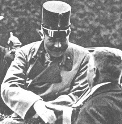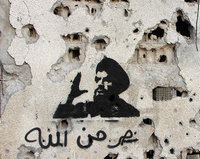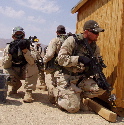I just returned from a short trip to Beirut — my first since the ceasefire was implemented on Aug. 13, 2006. Apart from the roads and bridges damaged by Israel on the Damascus-Beirut road, everything seemed fine and normal in Lebanon. Malls were busy, offering 60 percent discounts, and so were clubs, casinos, hotels, and restaurants. Commercial billboards, usually reserved for advertising, were all booked by Hezbollah and showed signs praising the Lebanese resistance and its leader Hasan Nasrallah. One notable billboard showed a huge picture of Israeli troops carrying the coffin of a slain soldier, draped with the Israeli […]
Middle East & North Africa Archive
Free Newsletter
Editor’s note: This is the latest installment of the World Politics Review Commentary Week in Review, in which we look back at the week’s opinion pages. The column will be posted every Saturday by noon. Last week, I said I was pining for somebody to write something about Iraq, given how the bloodshed there recently has been overshadowed by the Lebanon conflict. This week, I got my wish. While poverty in Asia, the future of Iran, Lebanon, and the balderdash of Chavez and Mugabe all were represented in the opinion pages, this week’s op-ed action was rooted in the soft […]

Now that the border between Lebanon and Israel has changed from war zone to twilight zone — an eerie landscape where the potential for renewed fighting hangs heavily in the air — history’s pundits can review their recent pronouncements on the conflict to see just how useful they proved. They can examine what they wrote to see how much it really helped us understand what just transpired in the Middle East and how effectively they guided the peacemakers in their search for a solution. A close look, I’m afraid, will show that history’s lessons have proven confusing, contradictory and even […]

Amid the shattered dreams of a grand transformation, Lebanon, a land fabled for its vulnerability to foreign intervention, offered an opportunity, a deliverance from the troubles that have afflicted U.S. policy in the Middle East. Since at least 1990, Syria had established dominion in Lebanon and rendered it a base for all sorts of pro-Syrian militant organizations — Palestinian and Lebanese, secular and fundamentalist. Many Lebanese were not happy with the Syrian order, and the opportunity for change came with the assassination of the former Prime Minister Rafiq Hariri on March 14, 2005. Hariri was a man with a vision […]

“Italian troops are not going to Lebanon to disarm Hezbollah,” Italy’s foreign minister said Tuesday. Nobody is going to use force against a movement “considered by many Lebanese as patriotic” and “a sort of national resistance force,” said Massimo D’Alema in an interview with the Italian magazine l’Espresso. The August 11 U.N. Security Council resolution calling for a cessation of hostilities in Lebanon also said the Shiite militia should turn in their weapons. But D’Alema says the only “realistic solution” is for Hezbollah fighters to be integrated into the Lebanese regular armed forces – a process the minister estimates will […]

To better prepare its troops for tough counterinsurgency warfare, the U.S. military is investing in super-realistic exercises that combine traditional live-fire training with sophisticated cultural instruction and Hollywood-style special effects that blur the lines between training and combat. At the start of the so-called Global War on Terrorism, the military’s combat training infrastructure reflected an entrenched Cold War mentality. At the sprawling National Training Center (NTC) in California’s Mojave Desert, armored brigades maneuvered against an Opposing Force equipped with mock Soviet tanks. At the Joint Readiness Training Center (JRTC) in the Louisiana bayou, light infantry battalions trained on simulated battlefields […]
As the proverbial dust settles over the battlefields of southern Lebanon, a major change in the landscape of legal regulation of warfare is taking hold. This change, first exposed by the military operations launched by the United States against Al Qaeda, has led to the widespread expectation that conflicts between states and transnational non-state entities must be governed by the laws of war, a body of international law historically applied to conflicts between states. While the extent of combat and associated destruction witnessed by the world in the recent conflict between Israel and Hezbollah may suggest that such a proposition […]
The United States has no plans to join the U.N. stabilization force destined for southern Lebanon, but the Bush administration is pressing the international community to speed up troop deployment if the fragile cessation of hostilities has any chance of becoming durable. Technically, it is the U.N.’s responsibility to recruit and shape the 15,000-strong force, but World Politics Review has learned that on Wednesday foreign ambassadors in Washington were called to the State Department where a senior U.S. official called for more haste in pledging and sending contingents. Diplomats who attended the meeting, which was not publicly reported, said the […]
Editor’s note: This week we bring you the second installment of a new weekly column, in which we look back at the week’s opinion pages. The column will be posted every Saturday by noon. Condoleezza Rice says the U.N. resolution ending violence in Israel and Lebanon will be a major setback for Syria and Iran. No. Think again. The biggest winner was Iran. Hezbollah’s boss now has his sites set on the Lebanese presidency, and it’s only a matter of weeks before the Israeli prime minister is ousted. Op-eds and commentary this week were dominated by such assertions. But first, […]
Israelis take very seriously the admonition that during the life-and-death times of warfare, criticism of the government and the military must wait until the guns have gone quiet. This time, the effort to refrain from second-guessing proved particularly challenging. That’s because the results proved frustrating, painful and frightening in the 34-day war against Hezbollah. The rumbles of a political earthquake are now following the conflict that destroyed Israel’s aura of invincibility. Now that the soldiers are returning home, the shakeup will begin and the careers of respected politicians and military men will be changed forever. This conflict lasted longer than […]
BEIRUT, Lebanon — A few days before the outbreak of violence between Israel and Hezbollah here, I was sipping strong coffee and talking with a highly influential Lebanese man about something totally unrelated to war: The mass media popular culture revolution that has swept the Arab world in recent years. Karim Sarkis, deputy head of broadcast for the Lebanese Broadcasting Corporation (LBC) — the outfit whose smash hit reality show “Star Academy” rewrote the book on how to make money in the world of Arab satellite television — told me that one of the most significant new trends in the […]
Reality TV is managing to do in Iraq what few other Western imports have over the last three and a half years — gain a large and devoted grass-roots following. With more than a dozen home-grown shows already having taken to the Iraqi airwaves, the phenomenon has added another country to its global conquest. “These shows are appealing to anyone, but more so in Iraq because it’s being handed to people starving for a vision of something better,” says Dr. Douglas Gentile, Director of Research at the National Institute on Media and the Family. “We’re talking about a country experiencing […]
DAMASCUS, Syria — There has been a lot of talk in the international community, and in Syria and Lebanon in particular, about the status of the disputed Sheba Farms. The small area, made up of 14 farms spread out over 25 square kilometers, has been occupied by Israel since 1967. The governments of Syria and Lebanon insist that Sheba is Lebanese, while Israel and the U.N. claim that it belongs to Syria, since it was under the jurisdiction of Syria at the time of its occupation in the Arab-Israeli War of 1967. (Lebanon, after all, was not even involved in […]
Despite virtual around-the-clock coverage of the war between Israel and Hezbollah, one important aspect remains poorly understood: the reaction of the 300 million strong “Arab Street.” Turn on any Arab television channel, though, and you can’t miss the rage and widespread support for Hezbollah and Hamas: streets roiling with protestors, callers to talk programs denouncing Israel and the United States, and clerics defending Hezbollah and calling for holy war. Five years after 9/11, the West still struggles to understand this rage that pushes Arab masses to view radical groups as heroic forces of resistance. On one extreme, there are those […]
When Marine Lt. Gen. John F. Sattler presided over the July transfer of the American-led anti-terrorism task force in the Horn of Africa from the U.S. Marines Corps to the U.S. Navy, his statement of achievement was simple. “Since the camp was established [in late 2002] there has not been one terrorist attack in the Horn of Africa, although there have been many attempts,” he said. When the American military’s Combined Joint Task Force – Horn of Africa (CJTF-HOA) was established in November 2002 in the tiny country of Djibouti, the region was fast becoming a theater of operations for […]
The deepening crisis in Lebanon initially generated a flurry of commentary claiming that Israel had become engaged in a conflict against Shia Islamist radicalism, and that its intent to defeat (Iran-backed) Hezbollah had the full support of the Sunni Arab world. The initial criticism of Hezbollah by the Sunni Arab states of Saudi Arabia, Egypt, and Jordan fueled this analysis, and one op-ed piece from a U.S. newspaper published a week after hostilities broke out was titled “Iran against the Arabs.” Furthermore, an advisor to Israel’s defense minister recently said: “We are finally going to fight Hezbollah on the ground. […]
A rising chorus in the United States and elsewhere is now saying that the key to bringing peace to the Middle East, and ending the 23-day-old war in Lebanon, can be found in Syria. (It could also be found in Iran, but talking to Syria is a lot easier to swallow for Washington than talking to Tehran.) Among those to loudly lobby for dialogue with Syria are the veteran journalist Thomas Friedman of the New York Times, the Syria-expert at Oklahoma University Joshua Landis, Professor David Lesch, who is a biographer of President Bashar al-Asad, former Secretary of State Warren […]
